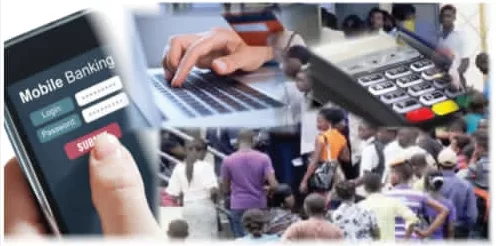From the barter system to the use of cowries, metals, paper money, cheques, and a host of others, money has transformed over the millennia mankind has dwelled on the face of the earth for transaction purposes.
Today, that transformation of medium of exchange and store of value is still ongoing, manifesting in electronic and virtual forms. For Nigeria to enjoy the status of a modern economy, it must adapt to the evolving trend.
But for seamless evolution of electronic and virtual money to take place, adequate infrastructure and expertise is sine qua non. Nigeria, at the moment, does not seem to have those in sufficient supply. Hence, the current transition to a cashless economy is having a toll on the populace, with no let-up in sight. The transition to Nigeria’s cashless economy has elicited acute scarcity of the local currency, which is compounding the woes of tens of millions of Nigerians on a daily basis. Worse still, criminal elements are having a field day at dispossessing Nigerians of their hard-earned wealth stored in banks.
Recently, Kaspersky said seven per cent of Internet users in Nigeria were victims of phishing in 2022. According to Kaspersky, which is an anti-virus provider firm, 8.7 per of its individuals and corporate users were affected by phishing attacks in 2022. It stated that 31.1 per cent of financial phishing attempts in Nigeria were through websites of fake payment systems, 51.2 per cent through fake online stores and 17.8 per cent through fake online bank portals.
Kaspersky added that it blocked 507,851,735 attempts to access fraudulent content globally in 2022, twice the number of attacks it thwarted in 2021.
Similarly, in 2022, the Nigerian Communications Commission (NCC) issued 15 security alerts to Nigerians and called for concerted efforts to clip the wings of hackers and other cybercriminals.
Indeed, in 2022, the financial statements of some 10 banks revealed that in the first nine months, they recorded N900.92 billion Profit Before Tax (PBT) despite a slow economic performance in the nation. The N900.92 billion was a 21.40 per cent increase from the N742.95 billion PBT recorded in the same period of 2021.
While the banks smiled as profits continue to rise astronomically, it would seem like they have been lethargic at investing in infrastructure that would serve the public, even as such infrastructure is needed to support their digital platforms now.
Nigerians have in the last six weeks borne the brunt of negligence on the part of the banks and the regulator, Central Bank of Nigeria (CBN).
In the face of acute naira scarcity, Nigerians find it a daily struggle to make and receive payments, prompting some observers to discredit the claim by banks to have invested N100 billion in IT infrastructure.
Failure of ATMs to dispense cash, exorbitant charges by PoS agents and inability to get cash over the counter in banking halls, lately, has made Nigerians increase use of USSD and bank apps. The situation has made financial transactions worst hit, with either failed or delayed credit and debit experiences frustrating economic activities.
While speaking on the impact of the redesigned naira notes on banking infrastructure, the director of operations and head of ICT division at PPC, Dr. Patrick Ede, observed that the inadequacy of the e-payment channels to withstand the deluge of transactions orchestrated by the surge in the use of such channels for payment is causing many failed and unsuccessful transactions.
The number of PoS terminals rose from around 155,000 to 1.1 million as of April 2022, while the number of active banking agents is over 1.9 million, going by data from Shared Agent Network Expansion Facilities (SANEF).
These digital infrastructures have, however, been overstretched by the 45 per cent banked population across the country.
In the midst of all this, activities of hackers in the Nigerian digital space may be assuming a scary height following a report that about N2.9 billion was wiped out of an upwardly mobile digital-first bank after its platform was attacked.
According to the chief information officer (CIO), the crises were compounded by the shortage of technology-skilled workforce. “The japa crisis has impacted negatively on banking operations. Most of our skilled and tech-savvy guys have resigned and relocated abroad for bigger pay, security, and better working environment and condition.
There is no doubt that naira re-design policy introduced by the federal government is having a serious toll on Nigerians in the last two months. Citizens are having harrowing experience getting cash as naira scarcity has heightened leading serious pain, anguish and anger across the country.
The crisis has been worsened by the poor e- payment system which many Nigerians have taken as alternative. Poor services of the E-payment system has led to many citizens losing huge sums of money as many of the transactions have failed with customers funds being unnecessarily cut and customers being debited for failed transactions either at the Point of Sale (POS)operations and unfortunately also by bank apps.
In the past months of severe suffering, Nigerians have become even more vulnerable to criminals, who hack into their e- transactions to steal bank details through which many have been defrauded of their hard earned money.
One Mr. Ikechukwu Dominic, a mobile phone vendor, at a plaza in Maraba, in Nasarawa State, had a sad tale about the activities of hackers. He told our correspondent that he tried logging in his account details into a PoS managed by people who later to wiped out the savings he had made and left him with nothing.
I went to send money through a PoS and the transaction failed but I was debited. Then I asked the operator to reverse it and he requested for my bank details, which I hastily gave. I later discovered that the money I saved in that account has been removed as I kept getting debit alerts until the account was empty.
“I reported the matter to the bank when I couldn’t locate that operator or anything that could divulge his identity. I was then told that my account detail has been hacked by criminal elements. I have since reported the matter to the security agencies for investigation. But the situation is really sad and frustrating.”
Another Nigerian, who just gave his name as Audu, appears a bit lucky to escape the menace of the hackers when he mistakenly sent his details to someone, who called him pretending to be a bank staff, who supposedly cared to assist him sort out a challenge with his account.
He said it was the timely intervention of an account officer that helped him block the hackers from taking his money which he said would have been devastating for him and his family if he had lost such huge amount of money.
“I was called on a certain day and the caller informed me that he works in my bank and wanted to help me get cash from the bank because of the cash crisis, I succumbed to this trick. He then sent me details of the amount of money I had in the bank with the bank logo. That in fact convinced me that he could be genuine and I called out my bank details when he requested for such.
“I was just lucky that a relative who heard me calling out my accounts details, warned me that it was a fraud. I then moved swiftly to my bank to lay a complaint and asked that they help me stop any e- transaction from that account.
“Just few minutes after I had left, the hacker called me to rain insults on me because I had gone to block the account. If I had lost that money, it would have been a disaster for me and my family in this critical time.
“The government must reverse this naira re-design so that people can come out this increasing hardship. We are tired of it,” he said.





